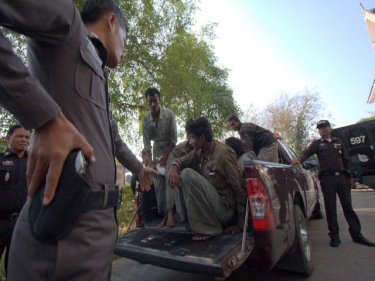Phuketwan Photo Album Above
ONE OF the biggest stories in the region this year was the Thai Army's controversial treatment of Rohingya boat people who landed on the Andaman coast in December and January.
News that Rohingyas were being pushed back to sea and left to drift with little food or water was initially denied by the Abhisit government. However the new PM later admitted to CNN correspondent Dan Rivers that ''pushbacks'' had occurred and that inquiries were underway to determine what branch of the military was responsible for these acts - which survivors and journalists believe led to the deaths of hundreds of boat people.
The dramatic Rohingya controversy was unearthed by reporters on a Phuket website that, ironically, was not regarded as significant enough to have its stories included on Google new alerts.
Alan Morison, the editor of Phuketwan.com, also realised that full details of the scandal were ''too big'' for his small team to reveal, and ''outside help'' had to be sought.
Morison, a newsman with years of experience on some of Australia's top daily papers, said Phuketwan had followed the plight of illegal immigrants closely since 54 Burmese suffocated in a container truck in Ranong in April 2008 after being smuggled into the country for work.
Late last year an officer from the Royal Thai Navy had called for UN help to manage the Burmese boat people. About 5000 Rohingyas had reached Thailand the previous sailing season - November to April - in boats that often landed on the Andaman coast. And the Samak government had been looking at ways of dealing with them.
Navy staff had provided numerous photos of their personnel detaining boat people on beaches on the Andaman coast and nearby islands ''doing what they are supposed to do''. These, he said, were posted on the Phuketwan website.
What they didn't know initially - but learned eventually via villagers in Ranong and sources in different sections of the military - was that plans for a holding facility on an island off the coast to detain boat people and deter further arrivals of Rohingyas were superseded by a covert operation to deal with the problem in other ways.
Morison was keen to go out on a vessel with Chutima Sidasathian, one of his reporters, to document how the boat people were handled once they reached Thailand or Thai waters.
They went to Ranong, three and half hours north of Phuket, and had an appointment to see the governor. They picked up a copy of the 10-baht Southern News Ranong.
Tucked away on an inside page was a story from a local council meeting which revealed the Army was going to take over handling of the Rohingyas. The boat people had become an issue of national security.
''We got interested in the Internal Security Operations Command coming to the Andaman region. There was talk of a detention centre for holding boat people.
''We were alert to the possibility of a bloody good story happening . . . and felt we should have a look, but I was amazed at what we found out. We confirmed the Army was now running the process.''
Morison relied on Chutima (''Oi''), a law graduate, who he said played a major role in finding the story.
Contacts with the Navy and marine police gave them photos, which were posted online, over a period of months.
''I thought the photos [of Rohingyas lying on the beaches after being detained by the Navy] were astonishing. They showed large bodies of men who may or may not be violent.
''We wanted to be on a Navy vessel so we could see what took place. Oi needed to talk to people as a reporter, but her contacts warned her not to take it beyond a certain point, so she said we shouldn't take this any further.
''We had sources saying that we couldn't report what was happening - villagers told us and we put two and two together.
''She actually called Colonel Manas (the local ISOC chief in charge of handling the Rohingya) and it reached the point where he challenged her, saying: 'Are you a Thai? Do you understand the need for stability?'''
Morison, who has worked in Phuket for six years, was ''very hesitant to go too far''. The story had become too hot, so he contacted the South China Morning Post, with whom he had a good relationship, having filed many stories for them following the tsunami.
''We thought there were risks involved. You have to be aware of the dangers of doing the wrong thing.''
The Hong Kong paper's international editor Ian Young sent chief Asia correspondent Greg Torode to take up the ''pushback'' controversy.
''People in uniform were concerned about what was happening,'' Morison said. ''But the Navy could only deny their involvement. They couldn't say 'Go and ask the Army'.''
ISOC continued to deny any role in pushing the Rohingyas back to sea. But further probing revealed the Army had trained about two dozen villagers to become a local paramilitary, the core of which was suspected to be doing this.
The first story appeared on page 8 of the SCMP in mid-January, with a pointer on the front page. It was read by a tourist who sent in photos of people sunbaking on an island off Phuket - a short distance from Rohingyas forced to lie face down in the boiling sun.
Morison interviewed the tourist over the phone and the SCMP ran that story as a front-page follow-up. ''From then on all other elements were exposed. People at CNN and the BCC became quite concerned,'' he said.
Survivors told a BBC reporter in India's Andaman Islands that Thai officials were forcing illegal migrants back to sea. The headline, on a report from Calcutta, was damning: 'Thais leave boat people to die'.
With heavyweights like The New York Times following up on the drama, there were claims of a conspiracy by the ''foreign media''.
Days later, a Foreign Ministry official lashed out at actress Angelina Jolie for commenting about the matter while visiting a refugee camp on the Thai Burma border (as an ambassador for the UN refugee body).
But while Thais cringed about the scandal, human rights groups and others working with refugees who knew the sorry plight of the Rohingya, viewed things differently. Suddenly an ethnic minority that had endured years of persecution in Burma and Bangladesh had the spotlight they so desperately needed.
The UN and governments on every side of the Andaman were forced to seek a better way to manage the Rohingyas' woeful predicament, most notably at home in Burma's Rakhine (or Arakan) State.
The ''Forgotten People'', as Rivers called them in three long reports on CNN, were a key item of debate when Asean leaders met at Hua Hin in late February.
''I was really pleased to see people like Dan Rivers and Jonathan Head stick with the story,'' Morison said. ''For two clear weeks it was the biggest yarn in the region because boats were turning up in Indonesia and the Andaman and Nicobar Islands, and people were scratching their heads in other countries and that was undermining the Thai denials (of not pushing the boat people back to sea).''
While the Thai press was slow to follow-up the story - something Morison blamed on ''kriengjai'' (respect for authority), he was sympathetic to Abhisit Vejjaviva and the Thai government about the predicament they faced, saying answers to the Rohingyan crisis were ''pretty hard to find''.
''What is disturbing is that this issue has been overlooked for 30 years. But at least its out there now.''
Malaysia's treatment of Rohingya was ''reprehensible'', he felt, noting that all boat people got six strokes of the whip plus three to six months jail before being stuck in a ''revolving door'' of being expelled and smuggled back to the country.
Seeing the Rohingya survivors brought to Ranong court in late January was vindication for their efforts, Morison thought.
''They were the lucky ones: the first Rohingya boat people in about eight weeks who had not been transferred to the Thai Army and pushed back out to sea, where hundreds had drowned.
Photos of these Rohingya, saved from expulsion at sea, told us what we needed to know: that journalistic curiosity, and perhaps a little bit of courage, can have positive consequences.''
Morison, 61, has worked on papers in Australia, London and Brunei since joining the Melbourne Herald in the late 60s. He has been involved in various start-ups and online sections, plus the Brunei Times and CNN.com ''before the Internet bubble burst''.
He had two years on the Phuket Gazette as chief sub before becoming a reporter again after the tsunami hit in December 2004.
Returning to reporting, he said, was like being a character in Clint Eastwood's 'Space Cowboys', a movie about elderly astronauts who get a chance to go back into space.
''I'm a reporter now the way I was back in the 60s, except I have to take my own photos. It's amazing to be part of that process, and also do the editing. I love it.
''It's a different world down here. We work seven days a week, but I like this life - I like telling people's stories. But we'll hit the wall later this year unless we get major sponsors.''
Phuketwan.com has broken numerous scoops since the site was set up in January 2008.
Morison felt frustrated at the ''failings'' of Google, the key Internet gate-keeper, and being stuck in a digital ''limbo land''.
''It really annoys me that we can publish scoops but (Google) still doesn't discriminate between good and bad,'' he said. ''What do you do if Google doesn't pick you up? The greatest story in the world could be on a local Internet site that nobody knows about.
''The Internet is drowning in muck that doesn't deserve to be there.''
Google agreed in mid-March to include stories from Phuketwan.com in its news alerts. Dan Rivers won an award from Amnesty International for his reports on the Rohingyas.
Republished by permission of the author.










Congratulations to you and your team.
You deserve it.
Posted by User and admirer of PW on September 3, 2009 18:57